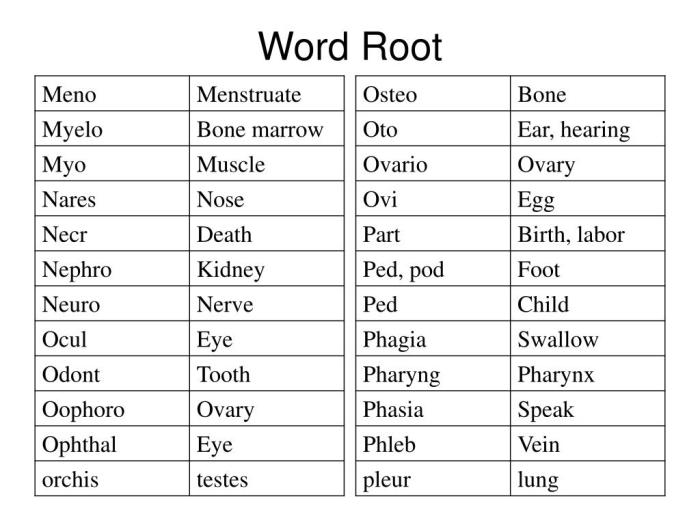Words with root word therm – Words with the root word therm, derived from the Greek word for “heat,” are ubiquitous in our vocabulary, spanning scientific and everyday contexts. Join us as we delve into the fascinating world of these temperature-related terms, exploring their etymology, scientific applications, cultural significance, and more.
From the precise language of thermodynamics to the colloquialisms of everyday speech, words with the root therm provide a rich tapestry of expression. We’ll uncover the historical evolution of these words, trace their regional variations, and examine the diverse concepts and synonyms associated with them.
Definitions and Etymology

The root word “therm” originates from the Greek word “thermos,” meaning “hot.” It is commonly used in scientific and technical contexts to refer to heat, temperature, or thermal energy.
Etymology of “therm”
The root word “therm” entered the English language in the 17th century from the Latin word “therma,” which in turn came from the Greek word “thermos.” The original Greek word referred to hot springs or baths.
Words Derived from “therm”
Numerous words in the English language are derived from the root “therm.” These words typically relate to concepts of heat, temperature, or thermal energy.
- Thermometer: A device used to measure temperature.
- Thermodynamics: The branch of physics that deals with heat and its relation to other forms of energy.
- Thermocouple: A device used to measure temperature differences.
- Thermolysis: The chemical decomposition of a substance by heat.
- Thermoplastic: A plastic that can be repeatedly softened by heating and hardened by cooling.
Meanings and Connotations of Words with “therm”
Words with the root “therm” can have different meanings and connotations depending on the context in which they are used.
- Heat:Words like “thermometer” and “thermodynamics” directly refer to heat or temperature.
- Measurement:Words like “thermometer” and “thermocouple” are used to measure heat or temperature.
- Energy:Words like “thermodynamics” and “thermolysis” deal with the relationship between heat and other forms of energy.
- Change:Words like “thermolysis” and “thermoplastic” imply a change in state or properties due to heat.
Scientific Applications

Words with the root “therm” play a crucial role in scientific fields, particularly those involving the study of temperature, heat, and energy.
These words help scientists describe and measure the thermal properties of various substances and systems.
Thermometers and Temperature Measurement
Thermometers are devices that measure temperature using the principle of thermal expansion. As the temperature of a substance increases, it expands, and this expansion can be measured and calibrated to indicate the temperature.
Words with the root word “therm” often relate to heat or temperature. For example, the word “thermometer” refers to a device used to measure temperature. Incidentally, if you’re looking for the to build a fire answer key , you can find it online.
Getting back to our topic, other words with the root word “therm” include “thermostat” and “thermos.” These words all have to do with regulating or measuring temperature.
- Mercury thermometers: Use mercury’s expansion to measure temperature.
- Alcohol thermometers: Utilize alcohol’s expansion for temperature measurement.
- Digital thermometers: Employ electronic sensors to detect temperature changes.
Thermal Energy and Heat Transfer
Words with the root “therm” also describe concepts related to thermal energy and heat transfer.
- Thermodynamics: The study of heat and its relation to other forms of energy.
- Thermal conductivity: The ability of a material to conduct heat.
- Thermal insulation: Materials that resist heat flow, preventing heat loss or gain.
Thermoelectricity
Thermoelectricity is the conversion of heat into electricity or vice versa.
- Thermocouples: Devices that measure temperature based on the thermoelectric effect.
- Thermoelectric generators: Convert heat into electricity, often used in remote or off-grid applications.
Everyday Usage
In our daily lives, we encounter numerous words derived from the root “therm,” which convey ideas related to temperature, warmth, or heat. These words help us describe and communicate about thermal sensations and phenomena.
Common Words
Some of the most common words with the root “therm” used in everyday language include:
- Thermometer: A device used to measure temperature.
- Thermostat: A device that regulates temperature automatically.
- Thermal: Relating to heat or temperature.
- Thermodynamics: The study of heat and its relation to other forms of energy.
- Thermos: A vacuum-insulated flask that maintains the temperature of its contents.
These words have become an integral part of our vocabulary, allowing us to express ourselves clearly and accurately when discussing temperature-related concepts.
Phrases and Expressions
In addition to individual words, the root “therm” also appears in various phrases and expressions that convey ideas about temperature:
- “Thermally efficient”: Describes a material or system that effectively retains or transfers heat.
- “Thermally conductive”: Describes a material that allows heat to pass through it easily.
- “Thermally insulated”: Describes a material or system that prevents heat from entering or escaping.
- “Thermal equilibrium”: A state in which the temperature of a system remains constant due to equal heat gain and loss.
These phrases and expressions provide us with a nuanced vocabulary to describe and discuss thermal phenomena in everyday contexts.
Cultural Significance

Words with the root “therm” have played a significant role in shaping cultural understandings of temperature, energy, and the natural world. They have influenced language, literature, and art, providing a rich vocabulary for expressing ideas about heat, cold, and thermal phenomena.
Language and Literature
The root “therm” has given rise to a wide range of words in English, including “thermometer,” “thermostat,” and “thermodynamics.” These terms have enabled precise communication about temperature and heat transfer, facilitating scientific discourse and everyday conversations. In literature, words like “thermal” and “thermic” evoke vivid imagery of heat and warmth, adding depth and sensory detail to literary works.
Art and Symbolism
The concept of thermal energy has also found expression in art. The depiction of fire, sunlight, and other sources of heat has been a common theme in painting, sculpture, and architecture. The use of thermal imagery can convey emotions, symbolize transformation, or create a sense of atmosphere.
For example, the “Inferno” section of Dante’s “Divine Comedy” vividly portrays the torment of hell through its descriptions of intense heat and scorching flames.
Cultural References and Idioms
Words with the root “therm” have also become ingrained in cultural references and idioms. The phrase “under the weather” is often used to describe feeling unwell, implying that a slight fever may be present. The expression “to be in hot water” signifies being in trouble or facing a difficult situation, evoking the discomfort of being immersed in scalding water.
Word Formation and Derivation
Words with the root “therm” are formed in various ways, utilizing prefixes, suffixes, and other grammatical elements to convey specific meanings.
The table below illustrates the common patterns of word formation:
| Word | Prefix | Root | Suffix | Meaning |
|---|---|---|---|---|
| Thermometer | Thermo- | -meter | – | Device for measuring temperature |
| Thermodynamics | Thermo- | -dynamic | -s | Study of heat and its relation to other forms of energy |
| Endothermic | Endo- | -therm | -ic | Absorbing heat |
| Exothermic | Exo- | -therm | -ic | Releasing heat |
| Hypothermia | Hypo- | -therm | -ia | Abnormally low body temperature |
| Hyperthermia | Hyper- | -therm | -ia | Abnormally high body temperature |
Related Concepts and Synonyms
Words with the root “therm” often share the common idea of heat or temperature. Here are some related concepts and synonyms:
Concepts
- Calorimetry:The study of heat and its measurement.
- Thermodynamics:The branch of physics that deals with heat and its relation to other forms of energy.
- Thermoregulation:The process by which organisms maintain a constant body temperature.
Synonyms
- Hot
- Warm
- Cold
- Feverish
- Tepid
Historical Evolution

Words with the root “therm” have undergone significant changes in their meanings and usage over time. Initially, the Greek term “thermos” meant “warm” or “hot.” As science advanced, the root “therm” became associated with the measurement and study of temperature.
Archaic and Obsolete Words
Many archaic or obsolete words with the root “therm” have been replaced by modern equivalents. For instance, the term “thermometer” was once known as a “thermoscope” or “heat measurer.” Similarly, the word “thermology” was formerly used to refer to the study of heat, now known as “thermodynamics.”
Regional Variations: Words With Root Word Therm

The root “therm” has spawned a diverse array of terms across different regions and cultures. These variations reflect the unique linguistic and environmental contexts in which these words have evolved.
Dialectical Variations
In various dialects, the term “thermometer” has undergone phonetic shifts. For instance, in certain parts of the United Kingdom, it is pronounced as “therm-om-i-ter.” Similarly, in some regions of the United States, the word “temperature” is often shortened to “temp.”
Cultural Influences, Words with root word therm
Cultural factors have also influenced the development of words related to temperature. In many Asian languages, the concept of “heat” is often expressed using different terms depending on the source. For example, in Chinese, there are separate words for “heat from the sun” and “heat from a fire.”
Regional Terminology
Certain regions have developed their own unique terms related to temperature. In Australia, for instance, the term “billabong” refers to a body of water that forms when a river overflows during the rainy season. In contrast, in parts of the Arctic, the term “permafrost” describes soil that remains frozen throughout the year.
Essential FAQs
What is the origin of the root word therm?
The root word therm originates from the Greek word “thermos,” meaning “heat.”
How are words with the root therm used in science?
Words with the root therm are commonly used in scientific fields like thermodynamics, where they describe concepts related to temperature, heat, and energy.
Can you give an example of a common word with the root therm?
Thermometer is a widely used example of a word with the root therm, referring to an instrument for measuring temperature.